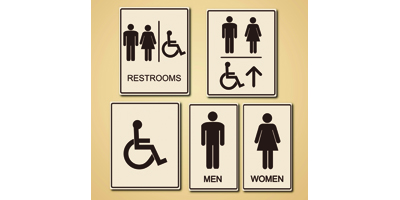A euphemism is an evasive word or expression used in place of one that’s taboo, negative, or offensive. “Gosh” is a way to avoid saying, “God.” We say “sleeping with” so we don’t have to say, “having sex with.”
Many experts condemn euphemisms saying prudery or a false sense of refinement underlies their use. U.S. lexicographer, Hugh Rawson, put it this way: “Euphemisms cover up the facts of life — of sex and reproduction and excretion.”
However, the euphemism isn’t at fault. It’s we, the people. We avoid certain words in writing and conversation and have found substitutes we think are less offensive. Not only do we skirt common words about such bodily functions as urination and bowel movements, we even use euphemisms for the places people go to take care of these things.
My thesaurus supplies 24 ways to avoid the word “toilet.” Slang and Euphemisms, by Richard A. Spears, offers 165 such words. Some are simple vulgarities — crude words to describe bodily functions.
But we’re examining euphemisms not synonyms.
Toilet, as we use it, has been in English only since 1819 and is U.S. in origin. Previously, toilet was defined as a “dressing table.”
Privy is apparently our earliest word for “bathroom.” Privy entered Middle English from the Latin privatus, via the French privé, both of which mean “private.” Johnson’s Dictionary of the English Language (1756) defines privy as, “necessary house.”
It’s easy to see where that came from and easy to discover that as far back as we look, euphemisms are employed to describe where “necessary” bodily functions occur.
The early term, lavatory (1656) comes from the Latin for “wash” (lavare) and clearly “washroom” and “bathroom” spring from that source.
Water closet, or W.C. (1755), commonly used in Britain, portrays the same thing. The OED defines water closet as, “a small room fitted up to serve as a privy and furnished with a water supply to flush the pan and discharge the water into a pipe below.”
Loo may also be linguistically related to water closet and lavatory. Loo’s origin is unknown but that hasn’t stopped speculation re its beginnings. It’s suggested that loo is a pun on “Waterloo,” or that it’s from “leeward,” the side of a ship away from the wind and hence the logical place to urinate to avoid blowback. Another idea is that loo comes from mispronunciation of the French l’eau (water).
Many euphemisms for toilet are pure slang — biffy, jakes, john, can, loo, bog, ajax, and others. Several are crudities.
Biffy is U.S. in origin, dated to the 1930s. John, also from the 1930s, began as U.S. college slang. Backhouse and outhouse are both late 19th-century American words.
Latrine is from 1642. Head is 19th-century nautical jargon, so-named because the ship’s lavatory was usually at the head of the vessel.
We avoid the word, toilet, because for some reason it is viewed as a vulgarity.
So the euphemism list goes on. We have washroom, bathroom, restroom, powder room, convenience, comfort station, ladies’ room, little girls’ room, men’s, gent’s, utility, cabana, and backhouse, to name but a few.
Which is your favourite?



